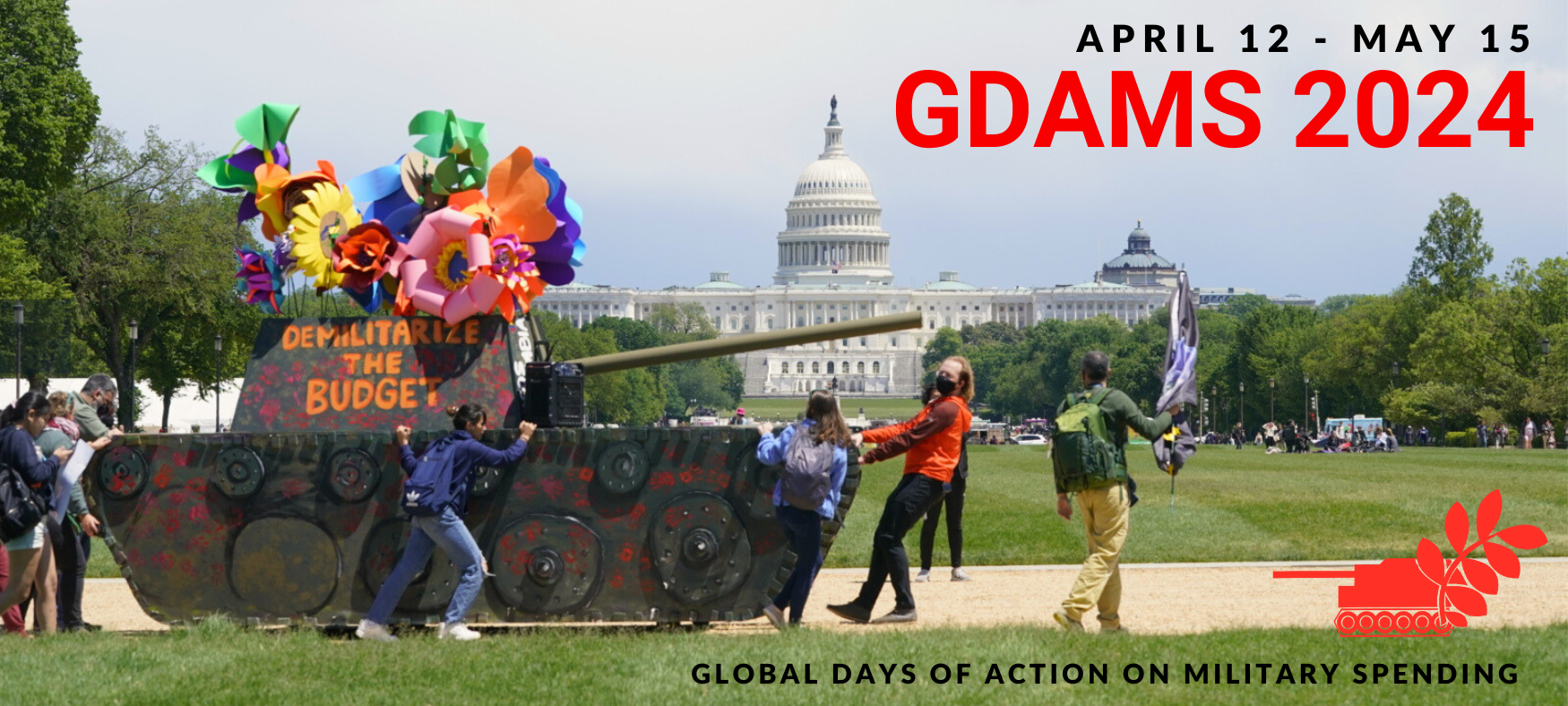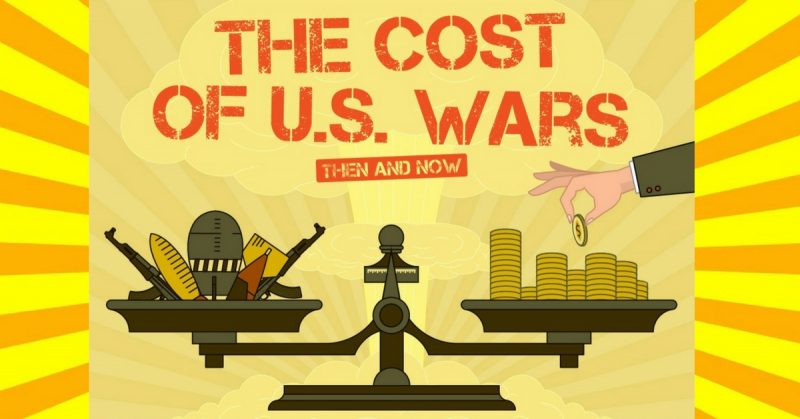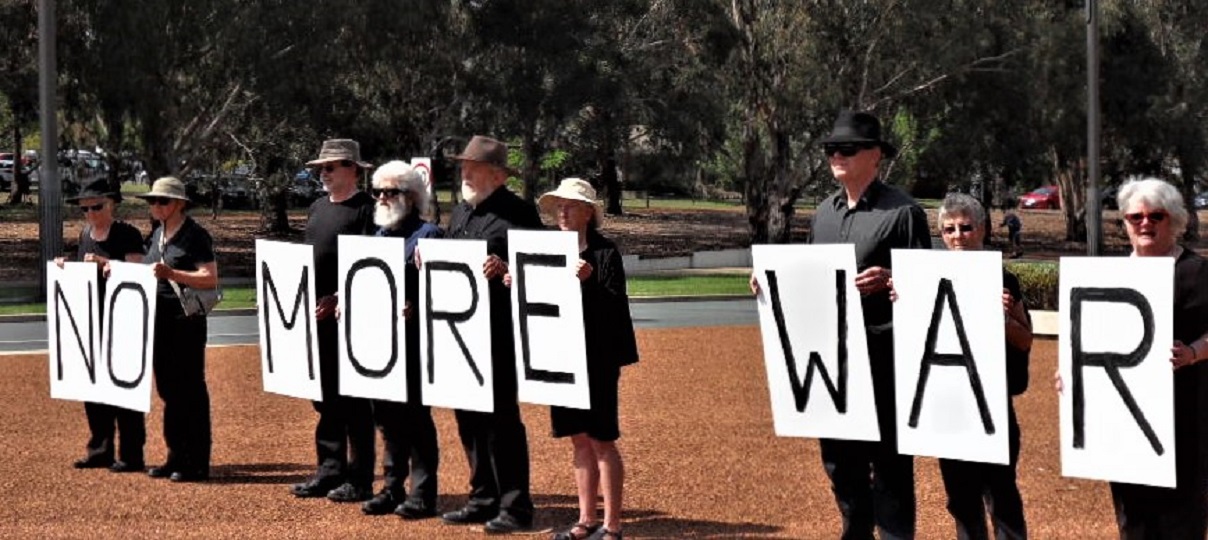
ACTION: GDAMS 2024 Has Started:
Five Weeks to Take Action for Peace!
Global Days of Action on Military Spending
WASHINGTON (April 11,2024) — Join us during our special period of action, the Global Days of Action on Military Spending.
• April 15: Tax Day in the USA
• April 22: SIPRI releases new data on military spending (2023 figures)
• April 22: Earth Day
• May 9: Europe’s Day of Peace
• May 14 and 15: C7 Summit, organised by Civil Society to Confront the G7

GDAMS 2024 Statement:
War Costs Us the Earth
Disarmt now to save people and planet
Humanity is at a crossroads where political decisions on defence budgets will determine the trajectory of the multiple crises in which we are immersed.
Wars and armed conflicts are devastating whole regions of the world. Global military spending has increased by 19 percent between 2013 and 2022 according to SIPRI figures, and has risen every year since 2015.
Yet, from Gaza to Ukraine, the DRC, Sudan, Myanmar, or Manipur, this has done nothing to resolve persistent conflicts nor reduce global tensions. Instead, increased military expenditure and intensifying militarism have only increased the volatility of global peace and cooperation. Rising temperatures are modifying climatic patterns in a profound and extreme way.
Millions of people are already experiencing the disastrous consequences of climate change and environmental degradation, amplified further by violent conflict. We must act now. These fluctuating weather and climatic patterns have direct repercussions on whether territories can remain habitable as well as on the future of decent and sustainable living conditions for all.
The world is at a geopolitical crossroads, even as we are moving away from the post-Cold War period into a new era of multipolarity yet disturbingly global leaders increasing their reliance on militarised solutions. Now, military spending is touted as a necessity for maintaining all aspects of security.
Meanwhile, a large network of interests and global power has emerged, led by a very few supranational private actors who control companies and influence governments in a purely undemocratic manner.

It is a global power network that includes and connects military and fossil energy businesses. A network in which militarisation not only causes the death of hundreds of thousands, but also becomes instrumentally responsible for environmental disaster by protecting fossil fuel interests and predatory actors.
A network that works, directly and indirectly, to prevent measures that could alleviate both the planetary environmental crisis and the suffering of millions ofpeople. A network that does not shy away from reaping profits from arms sales to genocidal actors, as we see in the military support given to Israel to continue its relentless attacks on Gaza.
We need to ensure democratic power across the globe. Military spending not only fuels wars and armed conflicts around the globe, it also takes away resources that could be devoted to addressing climate change, investing in global justice (including the UN Sustainable Development Goals), and promoting peaceful conflict transformation and disarmament.
Militaries are among the world’s biggest consumers of fuel, accounting for 5.5 percent of global emissions, while the use of chemicals pollutes the land around military bases, poisoning it for generations. The continued use of mines and cluster munitions, as well as conventional weaponry leaves land uninhabitable for generations. The opportunity cost of military spending costs us the Earth.
We are aware that the current challenges facing humanity (wars and conflicts, climate crisis, social crisis, crisis of democracy, pandemics, deforestation, loss of biodiversity and many more) are global and transboundary.
These challenges require a common and coordinated effort that can only be achieved by building new alliances among a wide array of actors — from civil society to international institutions, states, companies, and peoples — to finance and create justice, peace, and human rights for the planet.
Together, we must push for global common or collective security, one based on trust-building, cooperation, and solidarity. Reducing military expenditure is a necessary first step and the best opportunity to build peace and create a sustainable world with dignity for all.

To This End…
We call on governments to reduce military spending and instead address pressing global challenges that require all available resources. We must denounce the hidden interests and pressures of the military-industrial complex.
We call for real efforts aimed at global disarmament, stopping the arms trade and ceasing arms shipments to countries in conflict. It is time for the UNGA to commit to a final date and structure for a Fourth Special Session on Disarmament, noting that the last session was 36 years ago and that states have neglected their responsibility and duty to pursue disarmament through the United Nations framework.
We call on governments to prioritise justice over profits derived from arms trading; specifically we call on them to cease supplying arms to and buying arms from Israel and use all existing means topush for a ceasefire and an end to the genocide in Gaza.
We call for a sincere and active discussion on new and responsive international and regional security architectures based on the basic ideas of common security and the United Nations Secretary General António Guterres’ New Agenda for Peace. From Gaza to Sudan to Myanmar, conflicts will not be solved by military means. We call for a global ceasefire; the logic of peace must prevail over the logic of war.
We call for new geopolitics that leaves behind wars and violence, creating structures for global governance with an atmosphere of cooperation and dialogue. A new post-violent era must flourish, based on a culture of peace, feminist principles and dialogue-based conflict resolution.
We call on governments to act now. A real decarbonization plan is urgently needed. We also denounce the large fossil industry corporations that have hijacked and co-opted world governments.
We call on civil society across local, national, regional, and international levels, to join together in the campaign to combat the rising trend of military spending, to strengthen the global movement for peace and justice, and to challenge decision-makers who seek to justify a never-ending militarism in the name of our security.
So far we’ve carried out over 30 actions all across the globe. If you[re planning to carry out one, please let us know by sending an email to: coordination.gcoms@ipb.org
You can check out our map and list here